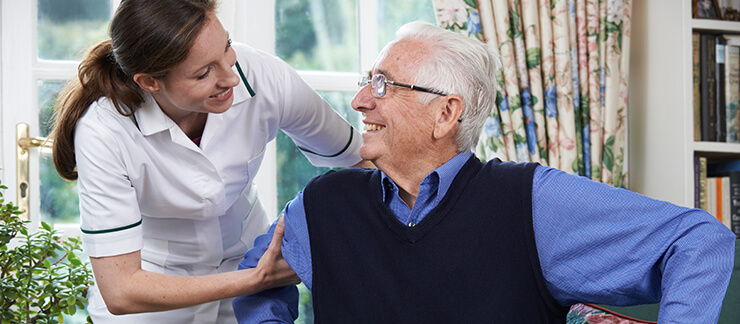
Paranoia in the Elderly
When an elderly loved one develops paranoia, it can be alarming for everyone. Paranoia can cause seniors to experience chronic fear, frustration, anxiety, and loneliness.
Don’t dismiss this condition as a natural part of aging. Consult a medical professional who will determine the cause of the issue and possible treatments. If paranoia goes unaddressed, symptoms may intensify and lead to more disturbing behaviors and actions.
What is Paranoia?
Paranoia is a mental state that causes a person to consistently—and irrationally—feel threatened, worried, or fearful. Examples of paranoia in the elderly include:
- Thinking someone is talking behind their back or is “out to get them”
- Feeling they are being overly mistreated
- Worrying someone is going to steal their money or possessions
- Fearing family members no longer love them because they don’t visit as often
- Becoming suspicious, distrustful, or jealous of others
- Hearing strange (non-threatening) noises that cause immense fear
What Conditions Are Related to Paranoia?
Some seniors experience delusions, which are false viewpoints a person steadfastly believes even though factual evidence proves the contrary. For example, they may think a neighbor stole their watch even after repeated attempts to explain the timepiece was misplaced and eventually found.
Hallucinations can cause older adults to see, hear, smell, or feel things that aren’t there. For example, they may imagine an intruder walking around the room at night or lurking outside their window.
What Causes Paranoia in the Elderly?
Paranoia may be related to an underlying problem, such as:
- Dementia, including Alzheimer’s disease
Often linked to memory loss, paranoia can occur in the elderly if they misplace things, forget instructions, or no longer recognize people. - Brain tumors
Brain tumors can cause mood or behavioral changes that manifest into a heightened mental state. - Brain damage caused by stroke or injury
Damage to certain areas of the brain caused by injury or disrupted blood flow can result in irrational thoughts and behaviors. - Medication side effects
Certain medications can cause cognitive changes in older people and result in delusions or hallucinations. - Psychiatric conditions
Paranoia is a symptom of schizophrenia, bipolar disorder, and depression. - Dehydration or heat-related illness
The elderly can be sensitive to the effects of dehydration and overheating, which can lead to drastic changes in their mental condition. - Untreated urinary tract infections
Urinary tract infections can occur due to changes in anatomy, poor toileting hygiene, or catheter use can cause delusions, hallucinations, and heightened fears in the elderly. - Social isolation
Social isolation is a widespread problem among the elderly and can cause or worsen their mental frame of mind.
What Should You Do if a Loved One Experiences Paranoia?
When symptoms strike at home, take the following steps to help your senior feel safe and secure:
- Acknowledge what they are experiencing
Don’t deny what they claim to see, hear, or feel, because it is real — and possibly very frightening — to them. Gently acknowledge their experience by saying, “I know you see/hear/feel/smell that, and it’s OK.” - Provide reassurance
Let them know they are safe, especially if they are feeling scared. - Avoid escalating
Try not to overreact during a disagreement, even if they are accusing you of something that is not true. An argument could cause your senior to become increasingly agitated or upset. - Redirect
Try to redirect their attention to something pleasant, such as a new topic of conversation, music, or activity.
Always discuss any possible signs or symptoms with a medical professional.
How Can an In-Home Caregiver Help Handle Paranoia?
Visiting Angels’ caregivers can help your elderly loved one by preventing social isolation, maintaining a safe environment, and serving as a reassuring, comforting presence in the home. Additionally, a professional in-home caregiver can monitor for new or worsening signs and bring it to your attention.
Contact your local home care office to learn how Visiting Angels can support a senior with paranoia. We will schedule a no-cost, no-obligation home care consultation.
